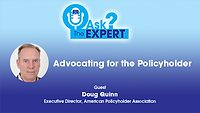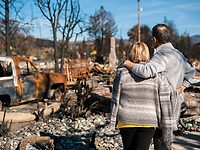American Policyholder Association Has its Eyes on Insurers’ Engineers

Photo credit: jonathansloane/E+ via Getty Images
“We’re ALL supposed to be in the business of helping people…”
No matter which side of the industry you’re on, helping people in their time of need is the common thread that ties us all together.
In the aftermath of natural disasters and single losses, restoration and cleanup professionals are often the first called to the scene to assess the damage and to meet with property owners who’ve lost everything they’ve worked so hard to build.
When policyholders who’ve suffered a loss are at their most vulnerable, insurer fraud should not be on their list of worries to consider.
Unfortunately, those traumatized by a loss often suffer from compromised decision making abilities —exactly when numerous life-changing decisions have to be made in a short period of time. For this reason, displaced property owners often end up becoming the prime targets for unethical professionals and fraudsters.
Having a perspective that spans all sides of the claims and restoration industry, we’ve seen more than our fair share of devastated homeowners and business owners who’ve lost everything. It’s a humbling experience that we as humans should never grow numb or accustomed to.
The American Policyholder Association (APA) is a consumer watchdog organization with a mission to defend policyholders who otherwise have little or no chance of standing up to these abuses. We work to ensure that those taking advantage of innocent victims are held accountable for their actions either by their licensing board or by a court of law.
Being in a leadership position of the APA, we’ve seen the good, the bad and the ugly when it comes to what goes on behind the scenes during the claims-handling process. We have developed a deep understanding of the long-term financial, psychological and physical repercussions that dishonest, unethical behavior and insurer fraud can cause in the lives of the people victimized by it. Compassion for these victims is what drives our mission at the APA to take action in stopping such egregious behavior in its tracks.
Right now, we’ve got our eyes on a disturbing trend that involves engineers who are looking to make nice with their big clients in a very illegal way.
Engineers and third-party administrators have often been called in to help supplement the claims-handling process when major natural disasters spread insurance-carrier personnel too thin. But, this is becoming more and more commonplace across the board on both one-off and wide-scale claims. And while we know that most engineers are honest, ethical professionals, there are a few bad actors who are spoiling things for the rest of the bunch.
Over the past few years, more and more questionable engineering reports have been brought to light from engineers who’ve succumbed to bias by skewing reports in an effort to tip the scales in the favor of the insurance carriers, and to the detriment of policyholders.
Which also brings to light an unanswered question as to why big insurers would risk their client relationships and even their reputations by hiring engineering firms with questionable ethics. After all, this wouldn’t be the first time big insurance has appeared to step over the line in an effort to save money on claims. Many wonder if the practice of hiring tainted engineers is an integral part of an overall strategy of “Delay, deny, defend.”
While the APA might not have the answers to these questions yet, we are focusing on this issue, and you should be too.
When it comes to cases of tried and true engineering fraud, one doesn’t have to look too far back in history to find a prime example.
One of the most nationally recognized, wide-scale engineering frauds occurred during the aftermath of Superstorm Sandy when numerous storm victims were deprived of honest flood insurance claims due to fraudulent engineering reports.
This widely publicized case of insurer fraud quickly turned into a national scandal that garnered media attention across the nation, and was featured on the 60-Minutes fraud investigation, “The Storm After the Storm,” as well as PBS Frontline’s “The Business of Disaster.”
“The Storm After the Storm” featured an interview with multiple storm victims and contractors, including an engineer who reported that more than 90% of his engineering causation reports were changed under the guise of a “peer review” in an effort to illegally deny claims. This resulted in storm victims being shorted on payments for damage that that should have been rightfully paid out to policyholders according to the flood insurance policies they’d paid for.
“The Business of Disaster” featured an expert who was hired by insurers to review claim files. He testified that he was pressured to have legitimate repairs removed from claims and was put in a position to threaten adjusters who didn't cooperate with loss of pay. This was done on a massive scale.
Up until Superstorm Sandy, insurance fraud had mostly been thought of as a one-sided crime committed by policyholders and contractors inflating claims in an effort to cash in on insurance policies.
But the wide-scale fraud committed by engineers and others hired by insurers after Superstorm Sandy shed light on numerous closed cases of potential fraud during disasters dating back to the early 1990s, and resulted in many victimized policyholders finally getting the justice they deserved.
It’s also what sparked the birth of a new non-profit watchdog group called the APA. No other organization like the APA has previously existed. Among our many accomplishments is the building of the first-ever Special Investigations Unit designed to protect you from carrier-side fraud. APA members can submit cases of suspected fraud to our SIU to be investigated and, where appropriate, referred to prosecutors.
How You Can Help Stop Engineering/Insurer Fraud
Engineers are required by law to be licensed in every state in which they function as an engineer. The state engineer licensing boards that govern them have strict ethics requirements with disciplinary procedures up to and including license suspension or revocation for engineers who are found in violation.
If you’ve witnessed fraud or have reason to suspect unethical conduct was committed by an engineer, their firm, an insurer or any other party involved in the claims handling process, you have an ethical responsibility to report it.
The APA has built an Engineer Tracking & Complaint Portal which is accessible via our website. The portal and complaint system are easy to use, enabling anyone to search and confirm if an engineer is licensed in the state where the loss occurred, view previous disciplinary records and/or to file a complaint directly with their state’s licensing board for investigation.
We’ve also developed a diagnostic program called APA Engineer Report Evaluation Program (AEREP) that can help property owners and professionals analyze engineering reports and detect potential violations.
The APA recommends that property owners and their representatives be proactive by following a defensive protocol as soon as an engineer is assigned, by having the property owner notify the engineering firm of three things:
- An appointment is required to come inspect their property.
- Their contractor, attorney and/or public adjuster will be present.
- The engineer’s entire inspection will be video recorded.
Property owners should be firm, but also be cooperative and not get in the way. These simple steps will help deter many of the problems that are reported to the APA with regard to engineer inspections.
By being proactive, and by educating your property owners about the risks of dishonest engineering and insurer fraud, you can help defend your clients from unethical claims professionals. This will help ensure fair insurance markets where policyholders suffering a loss have the best chance for an honest claim, a smoother process of rebuilding their property, and a faster return to a normal life. When this happens, the consumer, the restoration professional, and the insurer all win. Indeed, the American economy as a whole, benefits.
Looking for a reprint of this article?
From high-res PDFs to custom plaques, order your copy today!







